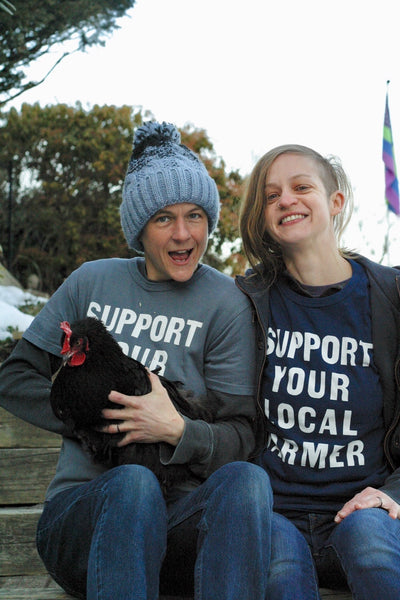
Sarah and Maeg wearing our Support Your Local Farmer Tee
___
Public Market Good's goal with these farmer features is to offer up our platform to amplify farmers' stories. We want to celebrate and champion farmers all across the globe and make their voices heard in the conversation around climate change and sustainability.
Being "ag-vocates" to us means advocating for the representation of all farmers, growers, and ranchers. Our hope is that #SustainabilityAgvocates fosters inclusivity and recognizing diversity within the farming community.
We are pleased to feature farmer Maeg Yosef as our fourth #SustainabilityAgvocate. Maeg farms at The Silver Fox Farm in Greenfield MA.
____
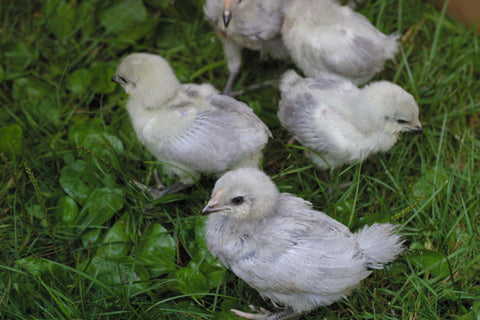
____
Tell us about your farm!
Silver Fox Farm is a small woman-powered poultry farm and humane hatchery run by me, Maeg, and my wife, Sarah. We sell hatching eggs and chicks, and our mission is to help others raise their own meat and eggs. Health and temperament are our top breeding priorities--we want our customers to enjoy productive and friendly flocks. We specialize in rare breeds that lay rainbow eggs and are proud to be a small, transparent alternative to large scale hatcheries.
____
Silver Fox Farm is a small woman-powered poultry farm and humane hatchery run by me, Maeg, and my wife, Sarah. We sell hatching eggs and chicks, and our mission is to help others raise their own meat and eggs. Health and temperament are our top breeding priorities--we want our customers to enjoy productive and friendly flocks. We specialize in rare breeds that lay rainbow eggs and are proud to be a small, transparent alternative to large scale hatcheries.
____
How did you get into farming?
Many years ago, before we got together, Sarah and I each kept chickens. When we purchased our little home on five acres, we knew we wanted to have chickens again and grow produce for ourselves, too. Food has always been a big part of our lives. We work in the food industry, love learning about food and agriculture--I even consider food my love language. We started with a garden and a small flock of chickens.
When we moved here initially, we did not intend to start a chicken farm! It was a natural evolution as we leaned into what brought us the most joy and satisfaction: our chickens. Once we started hatching our own chicks and processing our own meat, which was a powerful experience for us, we really started to get in deep. We wanted to help others produce their own meat and eggs, too, and experience the joys of chicken keeping.
We’ve focused on breeding chickens that are perfect for a home or small scale flock: healthy, gentle, productive, and from a source that chicken keepers can feel good about. On our farm, no male chicks are killed at hatch as they often are at large scale hatcheries. Every rooster gets to live a quality life before we process them. Our birds have plenty of space and access to pasture; they have names and a full social life. Everyone talks about “knowing where your food comes from,” and that’s important. It’s also important to trace things back to the source. Where do your seeds come from? Your soil? Your baby chicks?
____
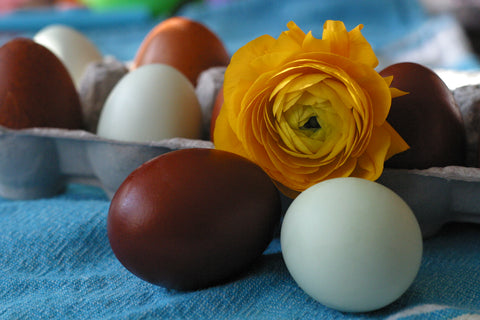
___
What are some of the biggest challenges you face as a farmer?
Two things that I think challenge anyone starting a business: time and mindset. Balancing marriage, kids, day jobs, self-care, and a farm in its early stages is absolutely a challenge, but it also encourages me to prioritize and stay efficient and balanced. In terms of mindset, I believe that anytime you start something new, be it a farm or a new workout routine, mental resistance kicks in and attempts to derail you, to keep you in your comfort zone. It’s a natural part of growth, whether you’re starting a business or a new habit, but it’s still uncomfortable. For anyone experiencing this--keep going, it’s normal!
____
What are your thoughts and beliefs on farming in the face of climate change?
Well, depending on how it's done, farming can be part of the problem or part of the solution. There is so much that we can be scared or angry about in the world right now. Instead of fighting the present, I’d rather create the future: something joyful for myself and others, something that is part of the solution. I like to think that our farm is a tiny bit of the solution, for both climate change and animal welfare issues.
Our specialty is helping people close the loop on their protein sources by producing their own meat and eggs. I know that might sound small in the face of an overwhelming issue like climate change, but enough small actions do add up. Remember Victory Gardens? At points during World War II, home gardens in the U.S. produced almost half of the produce consumed in the U.S. Supporting the war effort and dealing with food and gasoline shortages by growing your own food back then was a moral imperative--and that got results. Small efforts can have a collective impact. I’d argue that combating climate change is a moral imperative, too, and that our collective efforts can be powerful, even if it doesn’t feel that way.
Producing some of your own food is just one way to help the planet and impact climate change. I think it’s important to keep in mind that raising livestock and producing your own food is inherently privileged--I mean, it almost always requires homeownership, which is huge, not to mention time, money, physical work, and supportive local laws. I think there is this idea out there that the world can be saved one tiny homestead at a time. Even if that were true, it’s simply just not accessible, possible, or even desirable for everyone.
So while I believe wholeheartedly that small scale or home-based food production can help, it’s not going to save us all or feed us all. We need large scale solutions that can feed the world without destroying it, too. Farmers who are working on these solutions need our support as well.
___
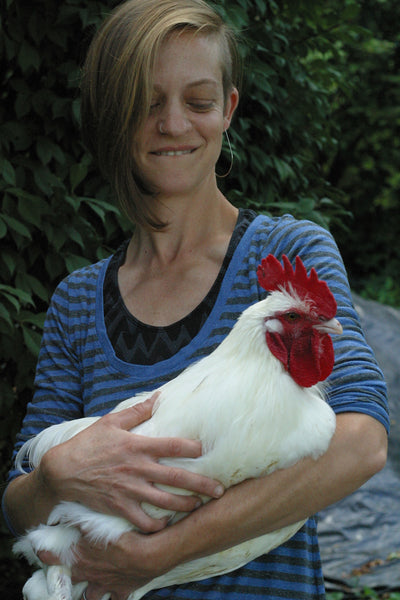
____
What are some misconceptions you hear about farming and agriculture when it comes to climate change that you'd like to address?
The misconceptions that hit closest to home for me are the ones around meat. For example, “Meat is bad for the planet.”
I bought into the hype from a young age! When I was 10 or 12 I read Animal Liberation by Peter Singer and was floored by his detailed descriptions of factory farming. I became a vegetarian. At the time, I thought that large scale, animal torturing, earth-destroying factory farming was the only farming out there. It wasn’t until I was much older that I learned that the issue was far more nuanced.
I learned that meat could be produced outside of a factory farm in a way that actually benefited the land. I learned that rain forests were being burned down to grow soy for my tofu stir fry. Both of these moments were total eye-openers for me.
I think it’s important to remember that agricultural and food issues are often framed for us, as consumers, in reductive terms: “Meat is killing the earth, go vegan.” It’s marketing with a kernel of selective truth inside--yes, many aspects of the meat industry are contributing to climate change. But meat can also be part of the solution, like pastured meat on regenerative farms or roosters you’ve raised and processed yourself. I think it’s hugely important as we navigate these complex issues to keep an open mind, do our research, and be willing to change our thoughts and practices.
_____
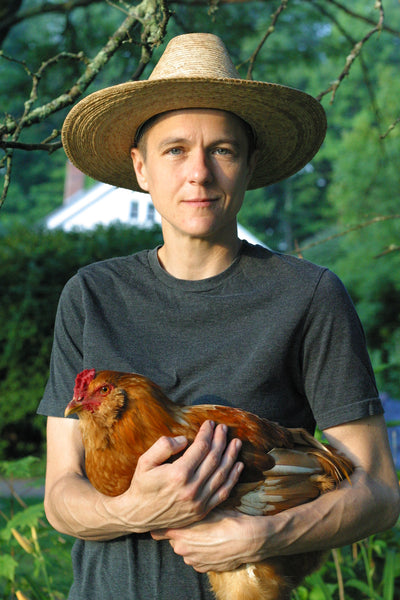
____
What future are you farming for and how do you think your farm can make a difference?
We are farming for a future where food animals are treated with love, care, and respect throughout their lives, and processed with kindness. We are farming for a future where people are creating solutions to food security and climate change on many scales, from small to large. Working on a small scale, we empower people to close the loop on their protein sources, produce their own eggs and meat, and make small efforts with a collective impact. Our part is to provide happy, healthy, friendly chickens from a small, sustainable source.
____
Where can we follow along and support The Silver Fox Farm?
Website: www.thesilverfoxfarm.com
Instagram: @thesilverfoxfarm

